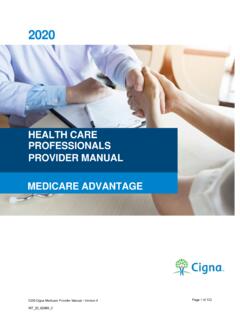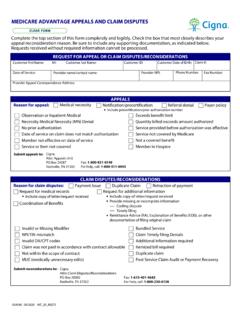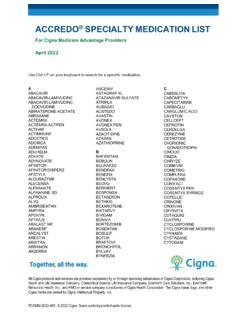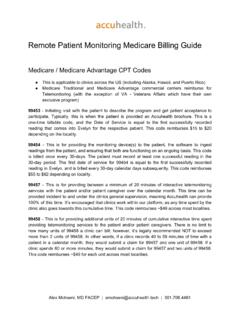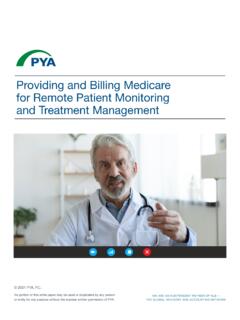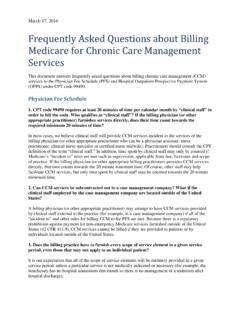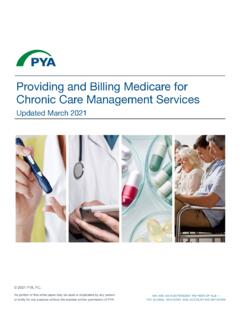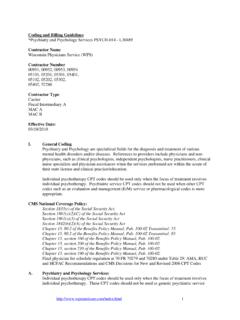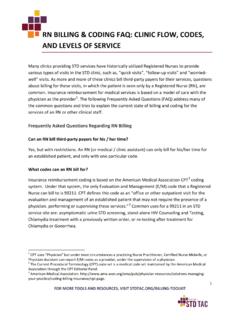Transcription of COVID-19 MEDICARE ADVANTAGE BILLING & …
1 COVID-19 MEDICARE ADVANTAGE BILLING & AUTHORIZATION GUIDELINES Table of Contents Increasing Available Care .. 3 Referral Requirements .. 3 Utilization Management Guidelines .. 3 Authorization Requirements .. 3 Post-Acute Care, DME and Elective Procedures .. 4 Pos t- Ac ute Care Review .. 4 DME .. 4 Elective Surgeries & Procedures (Outpatient & Inpatient) .. 4 1135 Waiver Information .. 4 Hospitals without Walls .. 4 Emergency Room and Trans port .. 5 Coronavirus Aid, Relief, and Economic Security Act (CARES Act) .. 5 Sequestration .. 5 Inpatient Prospective Payment System (IPPS) Hospitals- DRG Payment Increase .. 6 Screening Guidelines .. 6 Testing Reimbursement .. 6 Asymptomatic Individuals .. 7 Treatment of Confirmed COVID-19 Cases .. 7 Treatment of Confirmed COVID-19 Cases: Monoclonal antibodies.
2 7 COVID 19 Vaccine .. 8 COVID-19 Vaccine Transportation Benefit .. 8 Telehealth .. 8 COVID-19 Telehealth Servic es .. 8 Non COVID-19 Telehealth Services .. 8 BILLING for Telehealth Services .. 9 Audio Only Telehealth (CPT Codes 99441-99443) .. 9 Electronic Consultations (eConsults) aka Inter-professional Consultations .. 9 CPT and Diagnosis Codes List .. 11 Frequently Asked Questions .. 16 Utilization Management .. 16 SARS-CoV-2 TESTING .. 17 COVID-19 Medical Treatment .. 17 COVID-19 Medical Vaccine .. 17 COVID-19 Telehealth Policy .. 18 Pharmacy .. 19 Additional Resources .. 19 Updated December 29, 2021- Highlighted text indicates update On October 15, 2021, the Secretary of Health and Human Services (HHS) renewed the national public health emergency (PHE) period for COVID-19 through January 15, 2022.
3 Consistent with the new end of the PHE period, Cigna is extending cost-share waivers for COVID-19 diagnostic testing and related office visits through January 15, 2022. We also continue to make additional key accommodations related to facility transfers, credentialing, and virtual care as outlined on this page. To keep up to date with the important work CMS is doing in response to COVID-19 , please visit the Current Emergencies CMS website page. Increasing Available Care (Revised 12/29/2021) We recognize these are times of high demand for quality healthcare. In order to support the healthcare needs of our customers and help alleviate pressure to our existing network providers, we have implemented an accelerated initial credentialing process for providers performing critical COVID-19 related services.
4 This process will help to ensure we are able to meet our customers needs by onboarding critically needed providers into the network quicker. This accelerated initial credentialing process will be available through March 31, 2022. It is requested that providers identify their application as COVID-19 related upon submission. Standard credentialing and onboarding requirements for plan participation apply. CMS has also established a free hotline for providers to enroll and receive temporary MEDICARE BILLING privileges. Reference the CMS MEDICARE Provider Enrollment Hotline FAQ for details. Referral Requirements (Revised 10/20/2021) In-network Providers. Referral requirements (if required by customer s benefit plan) are waived for in-network provider services through January 15, 2022.
5 Out of network Providers. Referral requirements (if required by customer s benefit plan) are waived for out-of-network provider services through January 15, 2022. Utilization Management Guidelines (Revised 6/22/2020) Authorization Requirements Cigna requires authorization of certain services, medications, procedures, and/or equipment prior to performing or providing the service to prevent unnecessary utilization while safeguarding beneficiary access to the most appropriate medically necessary care. Authorization requirements apply for services provided by in and out of network providers according to plan rules as listed in the online provider manual. These guidelines apply to MEDICARE ADVANTAGE and MEDICARE -Medicaid customers. Using these recommended BILLING guidelines and codes will facilitate proper payment and help avoid errors and reimbursement delays.
6 References made throughout this document in regards to referrals and cost-share are only applicable if required by the customer s benefit plan. Exceptions: No authorizations are required for in- or out-of-network providers for the following: SARS-CoV-2 testing Treatment services associated with a COVID-19 diagnosis For further information on Prior Authorization Guidelines, click here . Post-Acute Care, DME and Elective Procedures Cigna has made the modifications below to the initial clinical reviews, DME and routine procedure requests. These modifications apply to both in and out of network providers. Facility authorization waiver (Revised 12/29/21) Effective December 29, 2021 through March 31, 2022, Cigna will waive the authorization requirement for direct emergent or urgent transfers from an acute inpatient facility to a second acute inpatient facility, skilled nursing facility (SNF), acute rehabilitation facility (AR), or long-term acute care hospital (LTACH) for the expressed purpose of freeing up emergently needed bed space.
7 This authorization waiver applies to all patients with Cigna MEDICARE ADVANTAGE plans. Additional important notes The receiving facility ( , second acute facility, SNF, AR, or LTACH) is responsible for notifying Cigna of admissions the next business day. Concurrent review will start the next business day with no retrospective denials. Coverage reviews for appropriate levels of care and medical necessity still apply to SNF, AR, and LTACH admissions. For patients already hospitalized, Cigna MEDICARE ADVANTAGE doesn t require three days of inpatient care prior to transfer to an SNF. Direct admission to a SNF can occur at any time. If a hospital does not have an urgent or emergent need to free up bed space, transfers will require precertification. For routine and non-emergent transfers, precertification is required to ensure coverage.
8 DME Documentation of face to face, physician order, and medical necessity is not required to obtain replacements of DME that is lost, destroyed, irreparably damaged or rendered unusable. All other authorization requirements for contracted providers apply unless specifically outlined in the Additional Authorization Guidelines Outside of PHE section below. The face to face waiver applies through January 15, 2022. Elective Surgeries & Procedures (Outpatient & Inpatient) Revised 12/29/21 Considering the pressure facilities are under, we will extend the authorization approval window from three months to six months on request. Eligibility should be confirmed prior to scheduling. Also note that medical necessity review is still required. 1135 Waiver Information (POSTED 4/24/2020) Hospitals without Walls On March 30, 2020 CMS announced additional waivers and temporary rule changes in an effort to increase hospital capacity to manage patient surges due to COVID-19 .
9 Under these temporary rule changes, hospital systems are permitted to perform services outside their hospital buildings and transfer patients to other facilities ( ambulatory surgical centers, inpatient rehabilitations hospitals, hotels and dormitories) while continuing to receive payment for hospital services from MEDICARE . This is otherwise known as known as Hospitals without Walls . Hospitals must continue to exercise the necessary control and responsibility over the use of hospital resources in treating patients regardless of whether the treatment occurs in a hospital setting or outside of a hospital setting. To ensure proper coverage and reimbursement, a facility providing care outside of a normal hospital setting should bill for the level of care provided, rather than the setting.
10 For example, if the level or care is intensive, regardless of the setting (tent, convention center, etc.) the services should be billed as if they occurred in an ICU under the contracted facility address, Tax ID and NPI. Emergency Room and Transport To allow greater flexibility in providing emergency services, the following rule changes are retroactive effective March 1, 2020 through January 15, 2022. Emergency Departments. EDs may test and screen patients for COVID-19 at drive through and other off-campus testing sites. Ambulances. May transport patients to a wider range of locations when other transportation is not medically appropriate. Locations may include: Critical Access Hospitals Skilled Nursing Facilities Community Health Centers Federally Qualitied Health Centers Physician offices Urgent care centers Ambulatory surgical centers Dialysis Centers Patients home (beneficiary s home) Coronavirus Aid, Relief, and Economic Security Act (CARES Act) (POSTED 4/24/2020) The CARES Act, passed on March 27, 2020, makes a number of changes to support the ability of the health care system to respond to the crisis over the coming months.
